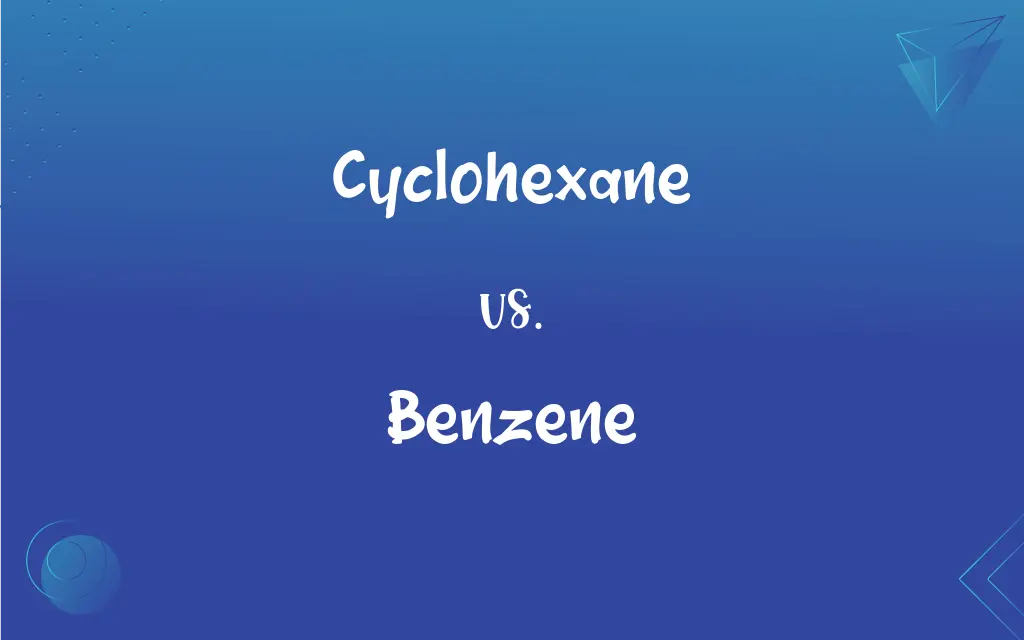Cyclohexane vs. Benzene: What's the Difference?
Edited by Aimie Carlson || By Harlon Moss || Published on November 20, 2023
Cyclohexane is a saturated hydrocarbon with six carbon atoms in a ring, while benzene is an aromatic compound with alternating double bonds in a six-carbon ring.

Key Differences
Cyclohexane and benzene are both six-membered carbon ring compounds, but they differ significantly in their chemical properties and structure. Cyclohexane is a saturated hydrocarbon, meaning it only contains single bonds between its carbon atoms. On the other hand, benzene is an unsaturated compound with a planar structure and alternating double bonds.
When considering reactivity, cyclohexane and benzene behave differently. Due to its saturated nature, cyclohexane generally undergoes substitution reactions. Benzene, however, due to its resonance-stabilized structure and aromaticity, is less reactive and tends to undergo electrophilic aromatic substitution.
From an electron perspective, benzene is rich with delocalized π electrons due to its conjugated double bonds. This delocalization provides benzene its stability and unique aromatic properties. Conversely, cyclohexane lacks this electron delocalization, making its behavior markedly different from benzene.
Toxicity and environmental concerns are also distinctions between cyclohexane and benzene. Benzene is known to be carcinogenic and poses various health risks upon exposure. Cyclohexane, while flammable, does not share the same degree of toxicological concerns as benzene.
Comparison Chart
Bond Type
Single bonds only
Alternating double bonds
ADVERTISEMENT
Chemical Reactivity
Undergoes substitution reactions
Undergoes electrophilic aromatic substitution
Electron Delocalization
None
Delocalized π electrons due to double bonds
Aromaticity
Not aromatic
Aromatic
Health Concerns
Flammable
Carcinogenic and toxic
Cyclohexane and Benzene Definitions
Cyclohexane
Cyclohexane is a six-membered saturated hydrocarbon.
The sample contained pure cyclohexane.
ADVERTISEMENT
Benzene
Benzene has delocalized π electrons.
The stability of benzene is attributed to its delocalized electrons.
Cyclohexane
Cyclohexane is a common solvent in labs.
We used cyclohexane as the solvent for the reaction.
Benzene
Benzene is an aromatic hydrocarbon.
Benzene is a common starting material in organic synthesis.
Cyclohexane
Cyclohexane is a cyclic alkane.
The molecule was identified as cyclohexane, a cyclic alkane.
Benzene
Benzene is a six-membered ring with alternating double bonds.
The aromatic nature of benzene makes it unique.
Cyclohexane
Cyclohexane possesses single bonds between carbon atoms.
Cyclohexane was chosen due to its lack of double bonds.
Benzene
Benzene is known for its carcinogenic properties.
Workers are advised to limit exposure to benzene.
Cyclohexane
Cyclohexane can exist in various conformations.
The chair conformation is the most stable form of cyclohexane.
Benzene
Benzene is a planar molecule.
The symmetric, planar structure of benzene was confirmed through X-ray crystallography.
Cyclohexane
A flammable, colorless, mobile liquid cycloalkane, C6H12, obtained from petroleum and benzene and used in the manufacture of nylon and as a solvent, a paint remover, and a varnish remover.
Benzene
A colorless, flammable, toxic, liquid aromatic hydrocarbon, C6H6, derived from petroleum and used in or to manufacture a wide variety of chemical products, including DDT, detergents, insecticides, and motor fuels. Also called benzol.
Cyclohexane
(organic compound) An alicyclic hydrocarbon, C6H12, consisting of a ring of six carbon atoms; a volatile liquid.
FAQs
What is cyclohexane?
A saturated hydrocarbon with a six-carbon ring.
How does the bond structure differ between cyclohexane and benzene?
Cyclohexane has single bonds only, while benzene has alternating double bonds.
Does cyclohexane have any double bonds?
No, it's fully saturated.
What is benzene?
An aromatic compound with a six-carbon ring and alternating double bonds.
Why is benzene considered aromatic?
Due to its stability and delocalized π electrons.
Is benzene reactive?
Yes, but it primarily undergoes electrophilic aromatic substitution.
Why is benzene considered carcinogenic?
Exposure has been linked to various cancers, especially leukemia.
Are both benzene and cyclohexane liquids?
Yes, both are volatile liquids at room temperature.
Is benzene naturally occurring?
Yes, it's found in crude oil and released from volcanoes and forest fires.
Why are benzene rings often seen in drugs and dyes?
The aromatic ring structure often plays a crucial role in the molecule's functionality.
What kind of reactions does cyclohexane undergo?
Mainly substitution reactions.
Is cyclohexane harmful?
It's flammable but not as toxic as benzene.
Can cyclohexane be converted to benzene?
Yes, through a process called aromatization.
How do the boiling points of cyclohexane and benzene compare?
They are relatively close, but benzene's is slightly higher.
Why is benzene more stable than expected?
Due to the resonance and delocalization of its π electrons.
Do cyclohexane and benzene have the same density?
No, their densities differ due to their distinct molecular structures.
Does cyclohexane exhibit resonance like benzene?
No, cyclohexane lacks the conjugated system benzene has.
Is benzene polar?
No, despite its alternating double bonds, it's nonpolar.
Can cyclohexane dissolve ionic compounds?
Generally no, as it's nonpolar.
How are benzene and cyclohexane used in industry?
Both are solvents, but benzene is also a precursor in many chemical syntheses.
About Author
Written by
Harlon MossHarlon is a seasoned quality moderator and accomplished content writer for Difference Wiki. An alumnus of the prestigious University of California, he earned his degree in Computer Science. Leveraging his academic background, Harlon brings a meticulous and informed perspective to his work, ensuring content accuracy and excellence.
Edited by
Aimie CarlsonAimie Carlson, holding a master's degree in English literature, is a fervent English language enthusiast. She lends her writing talents to Difference Wiki, a prominent website that specializes in comparisons, offering readers insightful analyses that both captivate and inform.






































































